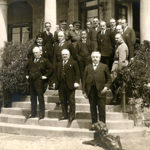Published September 14, 2009
Journal of Markets and Morality
Calculated Futures: Theology, Ethics, and Economics
D. Stephen Long and Nancy Ruth Fox, with Tripp York
Waco, Texas, Baylor University Press, 2007 (233 pages)
In Calculated Futures, a collection of eight essays on the intersection of theology and economics, economist Nancy Fox writes, “Both theologians and neoclassical economists appear to agree that the market is the best way for an economic system to achieve efficiency.” She adds, “Possibly the most significant source of conflict is the sheer ignorance of one discipline of the other” (43).
Actually, as this book confirms, the biggest problem is each discipline’s ignorance of its own history.
The first two chapters originated as debates between Fox and Methodist theologian D. Stephen Long, who team-taught a course on theology and economics at St. Joseph’s University in Philadelphia. Long and Fox’s course must have been lively: their exchanges entertain as well as instruct. Yet, as Long concedes, “We were…better at dividing than uniting” (18). Failure to nail down first principles also undercut agreement on their application.
Such mutual incomprehension metastasized after American university economics departments, led by the University of Chicago in 1972, abolished the requirement that students of economics master its history before being granted a degree. Addressing this problem thus requires a brief, remedial history of economics.
First, what is economics about? The short answer is production, exchange, distribution, and consumption. Scholastic economics (c.1250-1776) began when Thomas Aquinas integrated these four elements, all drawn from Aristotle and Augustine, at the individual, domestic and political levels. This “AAA” outline was taught by Catholics and Protestants (after the Reformation) for more than five centuries. (Lutheran Samuel Pufendorf’s version was widely known in the American colonies and cited by Alexander Hamilton among other founders.)
Classical economics (1776-1871) began when Adam Smith cut these four elements to two, trying to explain what he called “division of labor” (specialized production) by production and exchange alone. When three economists (W.S. Jevons, Carl Menger, and Leon Walras) simultaneously but independently reinvented Augustine’s theory of utility, reintegrating consumption with production and exchange, “neoclassical” economics (1871-c.2000) was born.
Adam Smith’s significance is therefore not what he added to, but rather subtracted from economics. The necessity of describing all four facets of any economic event with at most three equations has condemned classical and neoclassical economists frequently to resort to circular logic and/or empirically false assumptions.
For example, in arguing, “efficiency is the appropriate goal of an economic system” (30), Fox frequently shares Smith’s erroneous assumption that there is only one most efficient market “equilibrium.” Actually, as followers of Walras later proved, there is at least one for every possible distribution of income. This means economics can not be reduced to “efficiency.” Moreover, without the theory of distribution — at the personal level Augustine’s theory of personal gifts and their opposite, crimes, and in every human society Aristotle’s theory of distributive justice, which amounts to a collective gift — neither classical nor neoclassical economics can fully describe any state of equilibrium.
Long could not argue such points since he accepted much of Fox’s description on faith. Hence, I have confidence that the next phase in economics will be “neoscholastic.” It will not be because economists such as Fox suddenly draw back in horror at the theological errors identified by Long and fellow theologian Tripp York; rather, they will have to adjust an empirically inadequate theory or be swept aside — just as classical economists were by neoclassical economists.
There are also philosophical consequences. When Paul preached in the marketplace of Athens, he prefaced the Gospel with a biblically orthodox adaptation of Greco-Roman natural law. The evangelist Luke tells us that “some Epicurean and Stoic philosophers argued with him” (Acts 17:18).
The same dispute has continued among scholastic, classical and neoclassical economists; these entail the three logically alternative theories of human and divine nature. In scholastic natural law, economics is a theory of rational providence, describing how human creatures freely created by a divine Logos similarly choose both persons as “ends” (expressed by our personal and collective gifts) and the scarce means used by or for those persons, which we make real through production and exchange. By dropping both distribution and consumption, Smith expressed the Stoic pantheism that viewed the universe “to be itself a Divinity, an Animal” (as Smith put it in a posthumously published manuscript), with God as its immanent soul. In Smith’s view, sentimental humans choose neither ends nor means rationally, because each is “led by an invisible hand to promote an end which was no part of his intention.” By restoring consumption but not distribution, neoclassical economics expresses the Epicurean materialism that claims we humans somehow evolved in an uncreated universe as merely clever animals, adept at calculating means but not ends, since “reason is, and ought only to be, the slave of the passions,” as Smith’s friend David Hume put it.
Among Calculated Futures‘ many virtues is Long and York’s clear recognition of “Adam Smith’s stoic theology” (24). “The question is which theology is being done, not if it is being done. Everything is theological,” Long writes (7).
This is correct, but Long and York unfortunately fail to distinguish consistently natural theology (what we can know about God by reasoning from common experience), from revealed theology (by which we accept through faith God’s revelation of who he is). They usually confine “theology” to revealed Christian theology — which is fine for preaching to the converted, but greatly narrows the audience addressed.
Moreover, Long tends to shoehorn issues into a two- rather than three-way debate, for example describing Max Weber as “the father of modern social science” (63) and putting him in the stoic camp. It’s more accurate to assign that distinction to Auguste Comte, who frankly treated his “positive philosophy” as a religion and who also popularized a principle Long adopts with zest: “I have suggested that no definitive account of the ‘real’ exists apart from a particular historical language” community (180). Both Comte (who traced his philosophy to Hume) and Weber were essentially Epicurean. Weber trained and identified himself as a neoclassical economist long before embracing the title of sociologist.
Similarly, Long cites theologian John Milbank and philosopher Alasdair MacIntyre to argue, with few qualifications, “I think Christianity must continue to be open to socialism in a way in a way it cannot be open to capitalism” (182), and “Christianity must hold forth the possibility of socialism and work for the abolition of capitalism” (183).
I attribute this opinion to failure to be clear what those terms mean. Ludwig von Mises went at Jesuit economist Heinrich Pesch hammer and tong as a “state socialist,” yet like most economists at the time, they agreed that socialism means common ownership of the means of production but not consumption, while communism means common ownership of the means of both production and consumption. In that sense, most married couples and families with children do literally live by the socialist principle, “from each according to his ability, to each according to his needs.” Marx erred in seeking to transfer it from the family voluntarily to the much larger political community compulsorily. Long vaguely considers sociali
sm instead “the possibility that workers can share ownership of their labor in a non-competitive system” (183).
In the final essay Long and York tackle the neglected theme of gifts. Though faulting fellow Christian theologians for replacing orthodox theology with dubious social science, they, too, succumb on the key point: “Anthropologist Marcel Mauss argues that the root of all economic exchange lies not in bartering, but in gift-giving” (190). George Gilder cited Mauss’s thesis in Wealth and Poverty (1980) to maintain the essential altruism of capitalism, which Long and York execrate.
Both would benefit from recalling Augustine’s penetrating analysis. “Human society is knit together by transactions of giving and receiving,” Augustine noted. Yet, these outwardly similar transactions are of two essentially different kinds: sale or gift. The main difference between scholastic and classical or neoclassical economics is precisely whether they acknowledge or ignore this distinction.
Following Milbank, Long uses neoscholastic as a term of abuse, but fails to note that it has nearly opposite meanings in theology and economics. In nineteenth and twentieth-century theology it meant removing, but in twenty-first-century economics it means restoring, Augustine’s fundamental insight: All persons (human or divine) are motivated by love, and all personal love is expressed with a gift.
The authors of Calculated Futures acknowledge their inability to resolve many of the issues they raise. But scholastic theology and neoscholastic economics offer the promise that economists and theologians can re-learn what both once understood well.
John D. Mueller is director of the Economics and Ethics Program at the Ethics and Public Policy Center, and a principal of the financial market consulting firm LBMC LLC, both in Washington, D.C. He is the author of Redeeming Economics: Free Markets and the Human Person (ISI Books, forthcoming).








